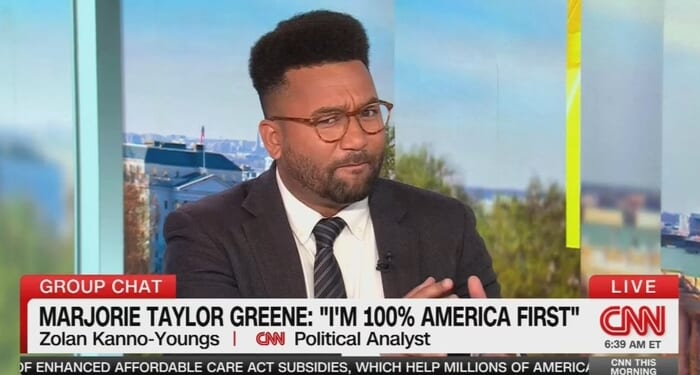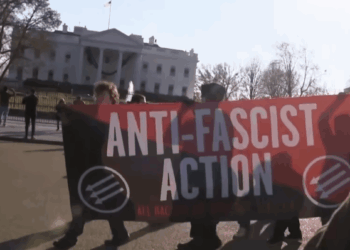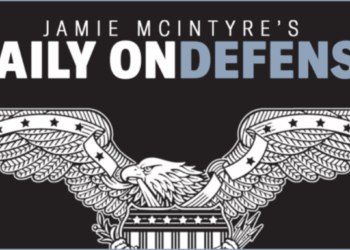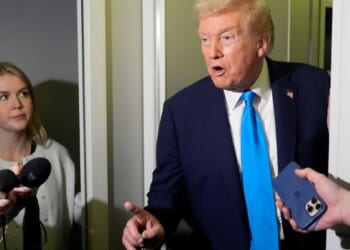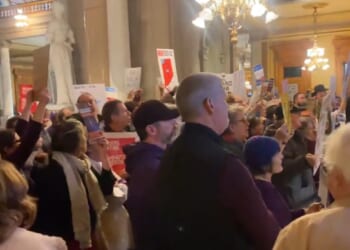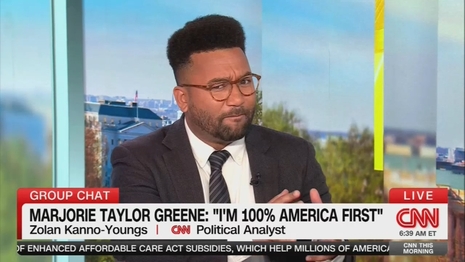 In classic Audie Cornish fashion, CNN This Morning offered perhaps some of the dumbest analysis possible when it came to American politics and government.
In classic Audie Cornish fashion, CNN This Morning offered perhaps some of the dumbest analysis possible when it came to American politics and government.
This time, the host and her liberal panelists imagined a disconnect existed between President Trump’s foreign policy accomplishments and his famous “America First” platform.
After recalling the President’s recent disapproval of longtime MAGA ally Representative Marjorie Taylor Greene (R-GA), CNN political analyst Zolan Kanno-Youngs amazingly pitted Trump’s international responsibilities against his America First agenda:
But I also thought what was fascinating is you then had him essentially defending a globalist view of the administration. He essentially said, “Look, if you’re gonna be U.S. President, you actually have to respond to the world’s conflicts.” Square that with some of what you heard from the President during the campaign. Square that with what you hear from many of his supporters talking about America […] first as well.
What? How does Trump solving problems across the globe run afoul of serving the American people? It’s literally half the President’s job to be an intermediary between America’s allies and adversaries. Less chaos abroad meant fewer opportunities for America to be dragged into a conflict that wasn’t about American interests.
Host Audie Cornish latched onto the idiocy by repeating the left-wing media’s claim that Trump was intentionally ignoring domestic issues over the past several months. Penny Nance, the CEO and President of Concerned Women for America, gave the obviously needed civics lesson:
CORNISH: We saw it with the Iran strikes. […] We see it in a couple of areas. Whenever the President goes further into international issues, so to speak, there is this rumbling of, like, “Why is he there? Why isn’t he focused on the U.S.?”
NANCE: Well, I mean, I think most people recognize he is President of the United States, and foreign policy is a big part of his job. We expect him to do that job well. And you can be America — in fact, you have to be America First when you’re dealing with other nations.
Did Cornish not understand that bilateral meetings are often planned well in advance and are not controlled by the whims of domestic politics?
Refusing to let go of her default understanding, Cornish diverted into an argument about the controversial strikes of Venezuelan boats. Bernie bro Chuck Rocha jumped to her defense by reverting the conversation back to MTG, and Kanno-Youngs brought up Trump’s obsession with winning a Nobel Peace Prize.
Nance, again, gave the reasonable take that Trump’s efforts led to some tangible good: “Let’s recognize that peace in the Middle East is good for the world and the United States. So, what he’s doing to try to secure that, whether it’s bringing more Abraham Accords together, actually having settling the war with Gaza and Israel. Bringing the hostages home, that like he just did. […] all of this is important to Americans, and he has both jobs to do, certainly.”
It’s almost as if the game was rigged against Trump from the start. No matter what, nothing was good enough to fully satisfy the left.
The transcript is below. Click “expand” read:
CNN This Morning
November 11, 2025
6:39:45 a.m. EST
(…)
AUDIE CORNISH: When the President finally says, “Hey, I don’t know what’s going on with this person.” What is that a signal of? Is there actual irritation —
ZOLAN KANNO-YOUNGS: His frustration.
CORNISH: — in the White House? Okay.
KANNO-YOUNGS: Yeah, yeah. His frustration with that.
CORNISH: Yeah.
KANNO-YOUNGS: He gave a long — I was in the Oval Office yesterday when this was asked, and he gave a long answer. Yes, there was that response to Marjorie Taylor Greene.
But I also thought what was fascinating is you then had him essentially defending a globalist view of the administration. He essentially said, “Look, if you’re gonna be U.S. President, you actually have to respond to the world’s conflicts.” Square that with some of what you heard from the President during the campaign. Square that with what you hear from many of his supporters talking about America —
CORNISH: Yeah.
KANNO-YOUNGS: — first as well.
CORNISH: On foreign policy, that’s —
KANNO-YOUNGS: I do think this is a source of tension —
CORNISH: Yeah.
KANNO-YOUNGS: — the focus on foreign policy compared to responding to domestic issues.
CORNISH: We saw it with the Iran strikes.
KANNO-YOUNGS: Yes.
CORNISH: We see it in a couple of areas. Whenever the President goes further into international issues, so to speak, there is this rumbling of, like, “Why is he there? Why isn’t he focused on the U.S.?”
PENNY NANCE: Well, I mean, I think most people recognize he is President of the United States, and foreign policy is a big part of his job. We expect him to do that job well. And you can be America — in fact, you have to be America first when you’re dealing with other nations. And I think whether it’s tariffs or whether it’s any other foreign policy, he’s done a great job with that.
CORNISH: But I think their argument is, basically, “You’re shooting people in Venezuela, we don’t know who they are, and there’s no evidence” —
NANCE: They’re bringing drugs, trying to bring drugs —
CORNISH: But we don’t have evidence and you haven’t presented it in any kind of court or anything. Even meeting with the Syrian President, who used to be a jihadist, it’s sort of surprising to see him move in these ways.
CHUCK ROCHA: Because he’s fed this base so much during the primaries. To Zolan’s point, like, this is how he got elected is he went to the folks and said, “We’re hungry at home. Why are we spending this money overseas?” —
CORNISH: And we wouldn’t talk to these people, and we wouldn’t talk to these people.
ROCHA: I’m not saying it’s right or wrong. I’m saying that’s what he said. Now he’s just saying something different. So, people like Marjorie Taylor Greene are like, “Hang on just a second.”
KANNO-YOUNGS: He also wants a Nobel Peace Prize, too. And a lot of these meetings about this are about sort of building his case for that last, sort of, accolade that he is hoping to get in terms of —
[Crosstalk]
CORNISH: He also, I remember, said, “America first is what I say it is.” Do I remember that during one of the other international crisis?
NANCE: Let’s recognize that peace in the Middle East is good for the world and the United States. So, what he’s doing to try to secure that, whether it’s bringing more Abraham Accords together, actually having settling the war with Gaza and Israeli. Bringing the hostages home, that like he just did. Omer Neutra, an American hostage, just came home to his parents and was buried two days ago. Itay Chen was just brought home to his family. I mean, all of this is important to Americans, and he has both jobs to do, certainly.
CORNISH: Yeah, it’ll be interesting to see, yeah, how people judge him on both of those things.
(…)

